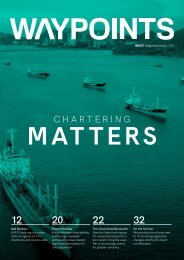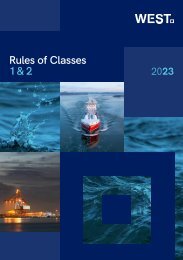Waypoints: Under Attack
Our launch issue is a cyber-themed special which examines the constant and ever-increasing threat of cyber exposures, and suggests measures by which maritime organisations can mitigate the potential damage to their business. Also included are features on the impact of the pandemic upon seafarers; the encouraging role played by big data within the shipping industry; what can be done to prevent tanker explosions; the advantages offered by electronic bills of lading; plus the first of our regular profiles of West offices in different territories, as well as a round-up of current legal cases.
Our launch issue is a cyber-themed special which examines the constant and ever-increasing threat of cyber exposures, and suggests measures by which maritime organisations can mitigate the potential damage to their business. Also included are features on the impact of the pandemic upon seafarers; the encouraging role played by big data within the shipping industry; what can be done to prevent tanker explosions; the advantages offered by electronic bills of lading; plus the first of our regular profiles of West offices in different territories, as well as a round-up of current legal cases.
You also want an ePaper? Increase the reach of your titles
YUMPU automatically turns print PDFs into web optimized ePapers that Google loves.
08<br />
Issue 01 WAYPOINTS<br />
WAYPOINTS Issue 01 09<br />
BRIEFCASES<br />
We look at the details of some recent cases, discuss the<br />
lessons to be learnt and examine the consequences and<br />
potential implications of each decision<br />
Eternal Bliss: claiming damages beyond demurrage<br />
In the Eternal Bliss case, the voyage<br />
charterer failed to discharge a cargo<br />
within the time allowed (laytime).<br />
As a result of the delay, and while<br />
the ship was on demurrage, the<br />
cargo deteriorated. This exposed the<br />
shipowner to a cargo claim from<br />
the receivers.<br />
The Commercial Court held that<br />
notwithstanding the ship being on<br />
demurrage, it was possible for the<br />
shipowner to also claim an indemnity<br />
against the charterer for the costs of<br />
the cargo claim.<br />
The consequence of this decision is<br />
that an owner may recover damages in<br />
addition to demurrage, if the<br />
owner can prove a separate type of<br />
loss which is unrelated to the loss<br />
of the use of the ship as a freightearning<br />
vessel.<br />
Why is this decision so important?<br />
Prior to this decision, it was thought<br />
that demurrage was the only remedy,<br />
and that an owner had to prove both:<br />
1. A separate type of loss, and;<br />
2. A separate breach of contract<br />
distinct from the failure to load<br />
or discharge the ship within the<br />
laytime.<br />
What are the possible implications?<br />
Owners may try to argue that if the ship<br />
suffers physical damage as the result of<br />
a delay beyond the laytime period, hull<br />
fouling or even if the vessel is liable to<br />
pay terminal charges or penalties, then<br />
these losses, in addition to related cargo<br />
losses, may be recoverable without<br />
having to prove a separate breach.<br />
Deck cargo exclusion clauses: Aprile SPA v Elin<br />
Maritime Ltd (‘The Elin’). Carrier’s liability excluded<br />
for unseaworthiness and/or negligence<br />
In the case of The Elin, the court<br />
held that a clause in a bill of lading,<br />
providing that certain cargo was<br />
‘loaded on deck at shipper’s and/<br />
or consignee’s and/or receiver’s risk;<br />
the carrier and/or owners and/or<br />
vessel being not responsible for loss<br />
or damage howsoever arising’, was<br />
effective to exclude a carrier’s liability<br />
for any loss of or damage to the deck<br />
cargo, including any loss or damage<br />
caused by the unseaworthiness of the<br />
vessel or the carrier’s negligence.<br />
Lesson to be learnt: <strong>Under</strong> English<br />
law, terms excluding liability are<br />
interpreted against the party trying<br />
to rely upon them. The mere<br />
expression ‘at shippers’, consignee’s<br />
risk’ will not transfer responsibility<br />
from the carrier to cargo interests in<br />
a situation where the crew is<br />
negligent or the ship unseaworthy.<br />
Clear words excluding liability for<br />
negligence and unseaworthiness<br />
must be printed on the face of the<br />
bill of lading.<br />
Recommended clause: ‘Xxx packages<br />
(description of the cargo)… shipped<br />
on deck at shippers/charterers’/<br />
consignee/receivers’ risk and<br />
responsibility without liability on the<br />
part of the vessel/owners for any<br />
expenses, delays, loss or damage<br />
however arising and even if caused by<br />
owners’ negligence or unseaworthiness<br />
of the vessel.’<br />
Click here for further information<br />
on this subject and read our circular<br />
The ACONCAGUA BAY:<br />
Court clarifies the<br />
meaning of an ‘always<br />
accessible’ berth<br />
This case related to a voyage charterparty on<br />
an amended GENCON 1994 form which, in<br />
clause 10, contained a warranty for ‘1 good<br />
safe berth, always afloat, always accessible...’<br />
(the ‘Warranty’). The term ‘always accessible’<br />
can be found in many dry cargo charterparties,<br />
including GENCON, North American Grain<br />
Charterparty and Americanized Welsh Coal<br />
Charterparty. While the vessel was loading,<br />
a bridge and lock were damaged. This resulted<br />
in the vessel being unable to leave her berth<br />
until 14 days after she had completed loading.<br />
The owners claimed for detention.<br />
Does ‘always accessible’ only apply to the ship<br />
entering, or does it also apply to leaving the port?<br />
The court held that ‘always accessible’ applies to<br />
both entering and leaving.<br />
Why is this decision so important,<br />
and what are the implications?<br />
There is a distinction between ‘reachable on<br />
arrival’, which only applies to the ship entering,<br />
and ‘always accessible’, which applies to the<br />
ship entering and leaving the port. It is important<br />
to consider this aspect when agreeing<br />
charterparty terms.<br />
While the vessel was loading,<br />
a bridge and lock were<br />
damaged. This resulted in<br />
the vessel being unable to<br />
leave her berth until 14 days<br />
after she had completed<br />
loading. The owners claimed<br />
for detention<br />
Julien Rabeux<br />
Senior Claims Manager,<br />
West P&I<br />
E Julien.Rabeaux@Westpandi.com<br />
No claim for charterers<br />
despite master’s negligence:<br />
Clearlake Shipping Pte Ltd<br />
v Privocean Shipping Ltd<br />
This claim related to the shipment of a cargo of<br />
soyabeans from New Orleans to China. The master<br />
had required that the cargo in hold number 2 be<br />
strapped in order to ensure the stability of the ship.<br />
Time was lost, and charterers put the ship offhire.<br />
The owners’ claim was for a balance of about<br />
US$400,000 of hire. The master’s actions resulted in<br />
the charterers incurring the additional expenditure of<br />
some US$410,000 which they counterclaimed from<br />
the owners by way of damages, on the grounds that<br />
the strapping was unnecessary and that the master’s<br />
insistence upon it was negligent.<br />
The charterparty incorporated the US COGSA and,<br />
in particular, Article IV Rule 2(a) of the Hague/Hague-<br />
Visby Rules, which states: ‘Neither the carrier nor the<br />
ship shall be responsible for loss or damage arising<br />
or resulting from… (a) Act, neglect or default of the<br />
master, mariner, pilot or the servants of the carrier in<br />
the navigation or in the management of the ship.’<br />
The court held that the master had indeed been<br />
negligent and that adequate stability could have<br />
been achieved without the need for strapping. The<br />
negligence of the master was a breach of the charter.<br />
However, owners were found not to be liable as their<br />
liability was excluded by virtue of Article IV Rule 2(a)<br />
of the Hague/Hague-Visby Rules.<br />
Why is this decision so important,<br />
and what are the implications?<br />
The importance of the Clause Paramount in the<br />
charterparty is often overlooked. It has wide-ranging<br />
implications and is not limited to issues relating to<br />
cargo claims. A distinction must however be made<br />
between acts which relate to ship management (which<br />
are exempted) and acts affecting the cargo (which are<br />
not exempted). In the above case, it was held that<br />
the master’s actions pertained to the stability of the<br />
vessel which related to the management of the ship.<br />
Click here for further information<br />
on this subject and read our guide<br />
Julien is a Senior Claims Manager in West’s Singapore office.<br />
He studied law in France and England before qualifying as a<br />
solicitor in a London shipping law firm. Julien worked at West’s<br />
office in Hong Kong for five years before moving to Singapore.










